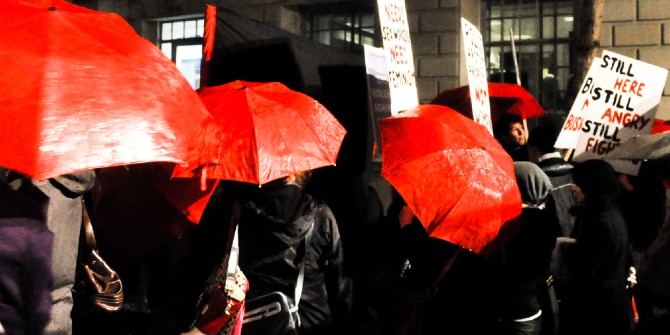Kate is a School for Policy Studies student, currently studying a PhD in Social Policy.
In this blog she argues that menstrual stigma is the major stumbling block to achieving menstrual equity. She also examines policies and attitudes towards periods.
Menstrual stigma and menstrual equity
Period products are now freely available in state-schools, Relationships and Sex Education has been revamped and the government has established a Period Poverty Taskforce. These developments are worth celebrating. However, more needs to be done to dismantle menstrual stigma.
What’s the problem?
Menstrual stigma involves periods being considered shameful. Period taboo is widespread:
- Plan International UK’s 2017 survey with a representative sample of 1,000 14-21 year old UK girls found that:
- 48% of girls were embarrassed by their periods
- 64% of girls had missed a PE or sport lessons because of their period, of which 52% had made up a lie or excuse
- Menstrual stigma can also be problematic for trans and non-binary people who feel that they must keep menstruation secret.

Policy
The government has introduced policies to improve access to products and education about periods. These are steps in the right direction. However, these policies will not end menstrual stigma.
All state-schools can now request free period products using an online portal. This momentous policy development means that products are accessible to young people who cannot otherwise afford them.
However, the policy has faced implementation issues and these appear to be, at least partly, explained by menstrual stigma. The scheme continued during lockdown, but Plan International UK’s survey with a representative sample of more than 1,000 14-21-year-old girls found that during this time:
- 30% of girls had issues accessing products during lockdown
- 42% of these girls did not know where to get hold of free products
- 30% felt too ashamed to seek out a source of free products
Furthermore, the BBC report that only 40% of eligible schools are signed up to the scheme. If young people are too ashamed to ask their schools for support and the government is not tackling taboos and promoting free products, the opt-in scheme will struggle.
From this year, Relationships, Sex and Health Education (RSE) is compulsory in all schools. Statutory guidance for teaching RSE has also been updated for the first time since 2000 and states that young people should learn about “menstrual wellbeing” and that schools should help girls manage periods.
The government has also released additional non-compulsory RSE teacher training and advice, which includes information about periods. However, neither the statutory guidance nor training mention tackling stigma.
Furthermore, the DfE’s bizarre advice that schools should not use resources produced by organisations that take “extreme political stances” such as anti-capitalism may undermine effective RSE and menstruation education. This advice is non-compulsory and it is unclear whether schools ever use anti-capitalist RSE resources. However, as Shout Out UK highlight, it is unclear how “schools are to facilitate a sufficiently diverse dialogue” on RSE topics (e.g. gender, periods and taboo) “without limiting themselves unnecessarily for fear that the resources they wish to use could be interpreted as being in breach of the guidelines.”
Advertisements
Advertisers’ portrayals of menstruation appear to be shifting. As Camilla Mørk Røstvik points out, many contemporary period product advertisements are designed to appeal to modern consumers who care about social justice. For instance, THINX were the first menstrual product company to feature a trans man in an advertisement.
It is encouraging to see companies taking these steps, but it would be naïve to ignore conflicts of interest. Companies aim to make sales and still promote products that hide periods. It therefore seems unlikely that advertisements alone can end menstrual stigma.
Steps forward
Critiquing menstrual stigma should be part of the every day. Policy makers should work with education practitioners and young people to capitalise on the opportunities presented by compulsory RSE and free period products. Menstrual stigma is a widespread, damaging problem that needs to be solved.
Kate’s PhD topic focuses on menstruation stigma, discourses in advertising and Relationships and Sex Education.
For more information on our PhD in Social Policy click here.


 “My background is the arts; I worked for the BBC for many years. This MSc meant I could commute from Devon, retrain my artsy brain into a science one and gain expertise. My love of Bristol now encompasses a deep loyalty to the University of Bristol, for its amazing facilities, sublime course content and world class teaching staff.”
“My background is the arts; I worked for the BBC for many years. This MSc meant I could commute from Devon, retrain my artsy brain into a science one and gain expertise. My love of Bristol now encompasses a deep loyalty to the University of Bristol, for its amazing facilities, sublime course content and world class teaching staff.”
